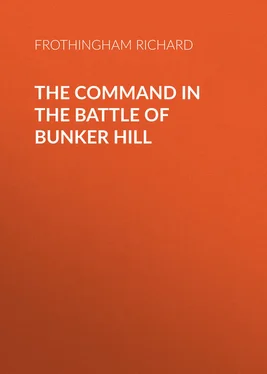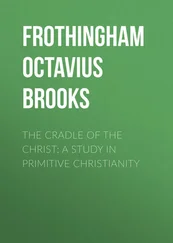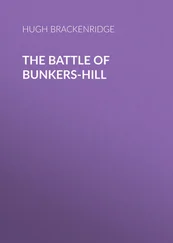Richard Frothingham - The Command in the Battle of Bunker Hill
Здесь есть возможность читать онлайн «Richard Frothingham - The Command in the Battle of Bunker Hill» — ознакомительный отрывок электронной книги совершенно бесплатно, а после прочтения отрывка купить полную версию. В некоторых случаях можно слушать аудио, скачать через торрент в формате fb2 и присутствует краткое содержание. Жанр: foreign_antique, foreign_prose, на английском языке. Описание произведения, (предисловие) а так же отзывы посетителей доступны на портале библиотеки ЛибКат.
- Название:The Command in the Battle of Bunker Hill
- Автор:
- Жанр:
- Год:неизвестен
- ISBN:нет данных
- Рейтинг книги:5 / 5. Голосов: 1
-
Избранное:Добавить в избранное
- Отзывы:
-
Ваша оценка:
- 100
- 1
- 2
- 3
- 4
- 5
The Command in the Battle of Bunker Hill: краткое содержание, описание и аннотация
Предлагаем к чтению аннотацию, описание, краткое содержание или предисловие (зависит от того, что написал сам автор книги «The Command in the Battle of Bunker Hill»). Если вы не нашли необходимую информацию о книге — напишите в комментариях, мы постараемся отыскать её.
The Command in the Battle of Bunker Hill — читать онлайн ознакомительный отрывок
Ниже представлен текст книги, разбитый по страницам. Система сохранения места последней прочитанной страницы, позволяет с удобством читать онлайн бесплатно книгу «The Command in the Battle of Bunker Hill», без необходимости каждый раз заново искать на чём Вы остановились. Поставьте закладку, и сможете в любой момент перейти на страницу, на которой закончили чтение.
Интервал:
Закладка:
2. Mr Swett accuses me of charging Colonel Sargent "with disobeying Gen. Putnam's order for him to go on to Bunker Hill. This injustice to the reputations of Putnam and Sargent arises from the most inconceivable misconstruction of Col. Sargent's letter to us," &c. &c, p. 11. And after considerable indignant comment – nearly two pages of it! – Mr Swett returns to the charge, and says: "These are all the facts the author has for the assertion, that Sargent disobeyed Putnam's order to go on to Bunker Hill," p. 12. Now where is such an "assertion" made in the Siege of Boston? The reader cannot find it ! Mr Swett refers to a note at page 168, but without quoting it. This note occurs where, in the text, an attempt is made to give a definite idea of Gen. Putnam's service throughout the whole affair, from the laying out of the works on Breed's Hill, to his retreat to Prospect Hill. One sentence reads – "Some of the officers not under his immediate command respected his authority, while others refused to obey him." It is to sustain this remark that reference is made to the following note: – "Captain Trevett, (Mass.) for instance, applied to Gen. Putnam for orders; while Colonel Sargent, (N. Hampshire) in a letter, MS., dated Dec. 20, 1825, writes that Putnam 'sent an officer to order me on to the hill, but finding I did not attend to his order he sent a second, who I took no notice of. A third came open-mouthed, saying,'" &c. This is the note referred to, and this is all that is stated about Colonel Sargent. Now who but Mr Swett names Bunker Hill? And what charge is made here? Let the reader look at p. 92 of the Siege of Boston, and say whether there was any disposition to do injustice to this brave officer. No such charge was ever thought of, much less made. It is one of Mr Swett's inferences. His indignation is gratuitous.
But the " injustice " I have been guilty of, Mr Swett says "arises from the most inconceivable misconstruction " on my part of Colonel Sargent's Letter. Now to show fully the height of this "injustice" and the depth of this stupidity, it may be well to let Colonel Sargent speak for himself. He was applied to by Mr Swett for information about the battle; and, in a letter dated Dec. 20, 1825, gives his story. Mr Swett, in this pamphlet, (Appendix,) quotes from the conclusion of this letter, but does not quote from the commencement of it, – doubtless relishing its details about fighting among the islands in Boston harbor far better than its details about Putnam and Prescott, and the Bunker Hill battle. It is proper now that the latter should be printed. I put a few words in italics. Colonel Sargent writes —
"Had General Ward marched the whole of his troops then in Cambridge to Charlestown not one of the enemy would have escaped, but instead of that he only walked Hastings's front yard the whole day. He ordered Stark and Reed from Medford, and those two regiments did all that was done that day, of any consequence, although the fatigue party stood their ground better than could be expected after a hard night's labor. In my opinion, Col. Prescott is entitled to the honor of having the command in his calico gown. I doubt much if General Putnam was on the ground of battle for the whole day , and that he had no regiment that I ever heard of. I made application three times that day to be permitted to march my regiment to Charlestown, but General Ward feared my post would be attacked, and for once judged right, for a large schooner, with from five to six hundred men, attempted to gain the landing, but the wind against her and the tide turning, she returned. About 4, P. M. , General Ward permitted me to march my regiment with one called his own to Charlestown, but too late to do any good. Gen. Putnam, then on Prospect Hill, sent an officer to order me on to the hill, but finding I did not attend to his order, he sent a second, who I took no notice of. A third came open-mouth, saying Gen. Putnam says the devil of hell is in you all, you will be all cut to pieces. The words were scarcely uttered when I was left with Lieut. Col. Ward and my waiter. I had before this received a scratch from a four pound shot – the same shot took off Lt. Col. Ward's cartouche box, and knocked down a subaltern behind him. I returned to headquarters."
This, Mr Swett confesses, is the only document relating to Colonel Sargent. Now with this as authority, what right has Mr Swett, as he does in his history, to put Col. Sargent under the immediate command of Gen. Putnam? What right has he to say, as he does in his pamphlet, that "Sargent found Putnam" on the top of Prospect Hill? As I read this authority, Putnam sent successively three officers to Sargent with an order which Sargent "refused to obey," but instead of joining Putnam, on Prospect Hill, he went to headquarters. It was a case where a New Hampshire officer declined to acknowledge the superior authority of a Connecticut officer; Sargent applied directly to General Ward for orders, but would not respect the orders of Putnam. The last point is the fact stated in the Siege of Boston. So much for the "injustice done to the reputations" of these two officers! So much for my "most inconceivable misconstruction of Col. Sargent's letter!!"
But there is more to be said about Prospect Hill , and here it is necessary to carry a bit of war into Africa. Mr Swett in his history (Notes p. 4) quotes from a letter by Rev. Joseph Thaxter, in which this hill is mentioned, though in the quotation it appears as " one of the neighboring hills "!! This letter was dated "Edgarton, June 15, 1818," and was addressed to Messrs Monroe & Francis. It will do no harm to print, for the first time, the whole extract. It reads —
"The writer yesterday saw Thos. Cooke, Esq. In 1775 he was a member of the Provincial Congress, and one of the signers of the sword in hand money. He was on the day of the Bunker Hill fight at Cambridge. He went down to Prospect Hill and saw the whole transaction of the day. He says that all was confusion, there was no command. That he saw Gen. Putnam, who did all that man could do to get on the men to Breed's Hill; that he appeared firm and resolute, thoughtless of personal danger, and that his praise was in the mouth of every one; that at that time nor ever after did he ever hear any one speak a disreputable word against him."
Mr Swett, in his history, besides suppressing the name of the hill, suppressed also the significant remark, " all was confusion, there was no command ." And he suppresses also Mr Thaxter's own opinion in the same letter, viz: – "As to military discipline and command there was none." Neither suited his purpose! To fit his theory exactly this letter of Thaxter's must be garbled !
On these two letters of Sargent and Thaxter, I remark, 1. They serve to show the character of this sort of authority, and how cautiously it must be used. 2. Here two manuscripts, so long unpublished, harmonize on one point. Sargent (1825) says that about 4 P. M. Putnam was on Prospect Hill: Thaxter's letter (1818) says that Thomas Cooke went on to Prospect Hill and saw Putnam, who did all man could do to induce men to go to Breed's Hill. Now Stiles (June 23, 1775) states that towards night Putnam went away from the action "to fetch across reinforcements, and before he could return our men began to retreat." 3. Sargent says Prescott was the commander, while Thaxter and Cooke say there was no command.
3. Here as well as any where, another charge of Mr Swett may be noticed, because it serves to show how far partizan feeling has carried him. He has nearly a page of disparaging remark on the history, because the name of this same Rev. Joseph Thaxter is not mentioned in it, and especially in connection with the celebration of the fiftieth Jubilee (1825) of the battle, when he made the prayer. Mr Swett, after remarking that he "looked in vain to find his name," says (p. 27) that, "The author has devoted twenty-two pages to this jubilee and monument, without one syllable to spare for the patriotism, eloquence, and unction of this most interesting relic of olden time, or for the mention of any religious service whatsoever on the occasion;" and again he remarks that, though I "dwell on Webster's eloquent address," yet there is " not the slightest notice " of any prayer; and finally , his pious indignation culminates in asserting that, "The neglect of all religious services on the occasion will be considered by all those who give credit to the author's history as a serious imputation on our national character"!! Well, our national character certainly ought to be looked after. But 1. As to the twenty-two pages of matter. The reader will find in them accounts of the early celebrations of the battle; of the first monument on Breed's Hill; of the origin and progress of the Bunker Hill Monument Association, and the only account of much length there is existing; a history of the building of the monument; a general view of the two great celebrations of 1825 and 1843, and of the Ladies' Fair; the cost of the monument, and a minute description of it! So much for this twenty-two pages about "this jubilee and monument!" Cannot Mr Swett state a thing right? 2. "A faint outline" only is presented of the great celebration of 1825; and of this, the whole notice in the text of the ceremony of laying the corner stone, and of the oration, including where I "dwell on Webster's eloquent address to the sovereign people," and even quote his splendid words, makes ten lines ! But it is not true that, in them, there "is not the slightest notice of religious services ;" for the account concludes, (p. 345) – " When the exercises here were concluded ," &c. One definition of " exercise " is "act of divine worship," and Mr Swett may look into either Webster's or Worcester's dictionary as authority! Now the "Address" had been mentioned, and "exercises" after it, manifestly , do not refer to wheeling regiments, but imply, in addition to the address, the acts of divine worship that, in this Christian land, are common on such occasions. Even the language itself must be perverted to sustain such libel as Mr Swett has written! And those who wring out of this account "a serious imputation of our national character," must hate this character intensely, be most inveterate word-catchers, and twist language from its obvious import. 3. It might have been better to have stated that Rev. Joseph Thaxter made the prayer, but no want of respect for the memory of this venerable veteran occasioned the "neglect." Better this omission, however, than to have been guilty of garbling and falsifying the account of the battle the patriot left behind him.
Читать дальшеИнтервал:
Закладка:
Похожие книги на «The Command in the Battle of Bunker Hill»
Представляем Вашему вниманию похожие книги на «The Command in the Battle of Bunker Hill» списком для выбора. Мы отобрали схожую по названию и смыслу литературу в надежде предоставить читателям больше вариантов отыскать новые, интересные, ещё непрочитанные произведения.
Обсуждение, отзывы о книге «The Command in the Battle of Bunker Hill» и просто собственные мнения читателей. Оставьте ваши комментарии, напишите, что Вы думаете о произведении, его смысле или главных героях. Укажите что конкретно понравилось, а что нет, и почему Вы так считаете.












